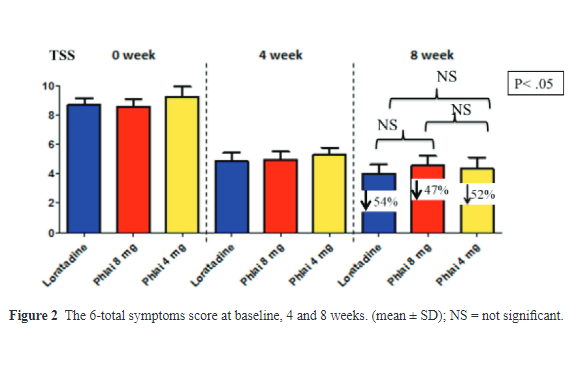Efficacy of Zingiber cassumunar Roxb (Phlai capsule) Compare with Loratadine as Treatment in Allergic Rhinitis Patients (Preliminary Results)
Keywords:
Zingiber cassumunar , Phlai, Allergic rhinitis, Antihistamine, Quality of lifeAbstract
Introduction: Phlai capsules can inhibit skin reactivity in allergic rhinitis patients.
Objectives: The aim of this study was to compare the efficacy of Phlai capsules with Loratadine in allergic rhinitis patients.
Methods: This was a multi-center, prospective, randomized, double-blinded, placebo-controlled study in 50 patients, aged 18-50 years old, who randomly received 4 mg or 8 mg Phlai capsules or Loratadine for 8 weeks. The primary efficacy endpoint was Total Symptoms Score at 4 and 8 weeks. The secondary endpoints were peak nasal inspiratory flow and quality of life.
Results: Demographic data was similar between groups. The change in 6-Total symptoms score decreased significantly from baseline. Peak nasal inspiratory flow increased with no significant differences between groups. According to the RCQ-36 questionnaire, there wassignificant improvement in quality of life for every domain, including sleep and emotion.
Conclusions: Phlai capsules reduced rhinitis symptoms and improved quality of life.
Downloads
References
Bousquet J, Schunemann HJ, Fonseca J, et al. MACVIA-ARIA Sentinel Network for allergic rhinitis (MASK-rhinitis): the new generation guideline implementation. Allergy. 2015;70(11):1372-1392.
Limvuttegrijerat T, Poachanukoon O, Koontongkaew S, Na Ayudhya TD. Crude ethanolic extracts of Zingiber cassumunar ROXB. inhibit PMA-induced MUC2 and MUC5AC expression via ERK inhibition in human airway epithelial cells. Asian Pac J Allergy Immunol. 2014;32(4):328-336.
Panthong A, Kanjanapothi D, Niwatananant W, Tuntiwachwuttikul P, Reutrakul V. Anti-inflammatory activity of compound D {(E)-4-(3',4'-dimethoxyphenyl)but-3-en-2-ol} isolated from Zingiber cassumunar Roxb. Phytomedicine. 1997;4(3):207-212.
Poachanukoon O, Meesuk L, Pattanacharoenchai N, Monthanapisut P, Dechatiwongse Na Ayudhya T, Koontongkaew S. Zingiber cassumunar ROXb. and its active constituent inhibit MMP-9 direct activation by house dust mite allergens and MMP-9 expression in PMAstimulated human airway epithelial cells. Asian Pac J Allergy Immunol. 2015;33(1):42-51.
Jitapunkul K, Poachanukoon O, Hannongbua S, Toochinda P, Lawtrakul L. Simulation Study of Interactions Between Two Bioactive Components from Zingiber cassumunar and 5-Lipoxygenase. Cell Mol Bioeng. 2017;11(1):77-89.
Tanticharoenwiwat P, Kulalert P, Dechatiwongse Na Ayudhya T, et al. Inhibitory effect of Phlai capsules on skin test responses among allergic rhinitis patients: a randomized, three-way crossover study. J Integr Med. 2017;15(6):462-468.
Khemawoot P, Hunsakunachai N, Anukunwithaya T, et al. Pharmacokinetics of Compound D, the Major Bioactive Component of Zingiber cassumunar, in Rats. Planta Med. 2016;82(13):1186-1191.
Koontongkaew S, Poachanukoon O, Sireeratawong S, et al. Safety Evaluation of Zingiber cassumunar Roxb. Rhizome Extract: Acute
and Chronic Toxicity Studies in Rats. Int Sch Res Notices. 2014;2014:632608.
Pirompanich P , Dechatiwongse Na Ayudhya T, Koontongkaew S, Poachanukoon O. A Phase I Study of Oral Phlai (Zingiber cassumunar Roxb.) Capsule in Healthy Adult Volunteers. Science & Technology Asia 2022 (in press).
Chongmelaxme B, Sruamsiri R, Dilokthornsakul P, et al. Clinical effects of Zingiber cassumunar (Plai): A systematic review. Complement Ther Med. 2017;35:70-77.

Downloads
Published
How to Cite
Issue
Section
License
Copyright (c) 2022 Asian Medical Journal and Alternative Medicine

This work is licensed under a Creative Commons Attribution-NonCommercial-NoDerivatives 4.0 International License.


